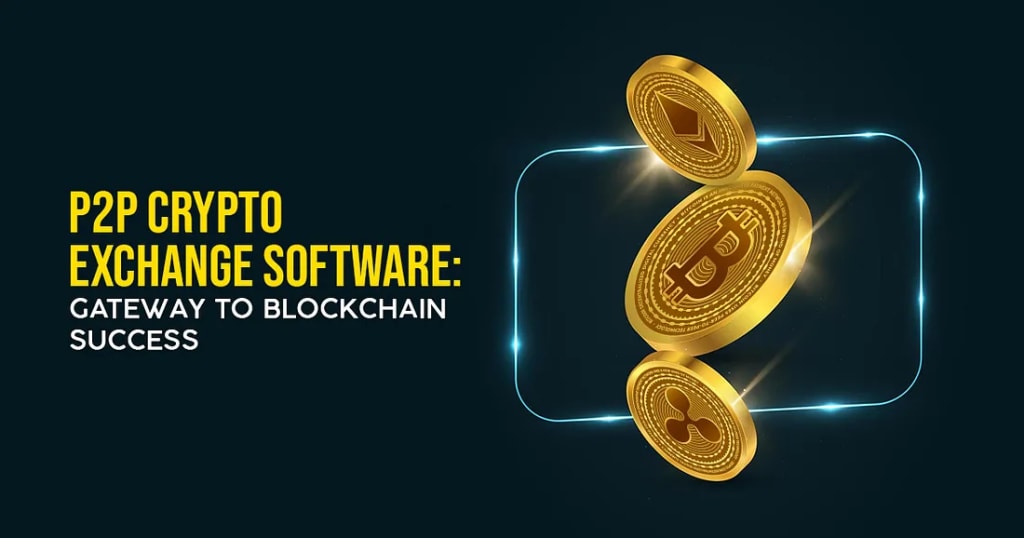Peer to Peer Power: Why P2P Exchanges Are the Future of Crypto
P2P Exchanges Are the Future of Crypto

The evolution of digital finance has been nothing short of revolutionary in recent years, with various technological advancements reshaping how we transact and manage our finances. One of the most groundbreaking developments within this space is the rise of Peer-to-Peer (P2P) exchange platforms. These platforms have disrupted traditional financial systems and empowered individuals by giving them more control over their financial transactions. In this article, we will explore the critical aspects of P2P exchange development and how it is revolutionizing the landscape of digital finance.
➡️Understanding P2P Exchanges
Peer-to-peer exchanges, often called P2P, are decentralized platforms that facilitate direct user transactions without intermediaries such as banks or financial institutions. Unlike traditional economic systems, where transactions are processed through a central authority, P2P exchanges operate on a decentralized blockchain network. This decentralization ensures transparency, security, and greater control for users engaging in financial transactions.
➡️Key Features of P2P Exchanges
Decentralization:
P2P exchanges leverage blockchain technology to operate in a decentralized manner. This means that there is no central authority controlling the transactions. Instead, a network of nodes validates and records transactions, ensuring transparency and eliminating the need for intermediaries.
Security:
Blockchain, the underlying technology of P2P exchanges, provides a secure and tamper-resistant system. Each transaction is cryptographically secured and linked to the previous one, creating a chain of blocks that is virtually impossible to alter. This enhanced security is a significant advantage over traditional centralized systems, where a single point of failure can result in a security breach.
Global Accessibility:
Geographical constraints do not bind P2P exchanges. Users worldwide can engage in transactions without currency conversion or international banking processes. This global accessibility opens up new opportunities for financial inclusion, allowing individuals in underserved regions to participate in the digital economy.
Anonymity and Privacy:
P2P exchanges often provide a higher degree of privacy for users. While transactions are recorded on the blockchain, users can engage in financial activities without revealing their identities. This anonymity can appeal to individuals who value privacy in their financial dealings.
Reduced Costs:
By eliminating intermediaries, P2P exchanges significantly reduce transaction costs associated with traditional financial systems. Users can send and receive funds with lower fees, making it a more cost-effective solution for small and large transactions.
➡️The Rise of P2P Exchange Development
The popularity of cryptocurrencies, particularly Bitcoin, laid the foundation for developing P2P exchanges. Bitcoin's decentralized nature and the blockchain technology it introduced inspired developers to explore new ways of facilitating direct peer-to-peer transactions. Over time, various cryptocurrencies and blockchain projects emerged, each contributing to developing and refining P2P exchange platforms.
LocalBitcoins: Pioneering P2P Trading:
LocalBitcoins, founded in 2012, can be considered a pioneer in the P2P exchange space. The platform allows users to buy and sell Bitcoin directly with each other, bypassing traditional banking channels. Users can choose their preferred payment methods, making it a flexible and user-friendly platform.
Decentralized Exchanges (DEXs):
The evolution of P2P exchanges led to the emergence of decentralized exchanges (DEXs), which operate entirely without a central authority. Platforms like Uniswap and PancakeSwap facilitate the trading of various cryptocurrencies directly from users' wallets. These exchanges rely on smart contracts to automate and execute transactions, providing a seamless and trustless trading experience.
Smart Contracts and Escrow Services:
Smart contracts, self-executing contracts with the terms of the agreement directly written into code, play a crucial role in P2P exchange development. They automate the execution of transactions, ensuring that funds are transferred only when predefined conditions are met. Escrow services, often integrated into P2P platforms, provide an additional layer of security by holding funds in trust until the transaction terms are fulfilled.
User-Friendly Interfaces:
The user interface of P2P exchanges has undergone significant improvements to enhance accessibility for a broader audience. Intuitive design, easy navigation, and customer support contribute to a positive user experience, attracting novice and experienced users to engage in P2P transactions.
Tokenization of Assets:
P2P exchanges are not limited to cryptocurrencies; they have extended their capabilities to tokenize various assets. This includes tokenized real estate, commodities, and even traditional financial instruments. Tokenization enables fractional ownership and facilitates the trading of traditionally illiquid assets.
➡️Challenges and Opportunities
While P2P exchanges have revolutionized digital finance, they are not without challenges. Some key issues include regulatory uncertainties, security concerns, and the potential for illicit activities. Regulatory bodies worldwide are still adapting to the fast-paced development of the cryptocurrency and P2P exchange space, leading to a need for clear guidelines in some jurisdictions.
However, these challenges also present opportunities for further growth and development. Collaborations between the private sector, regulators, and technology innovators can create a conducive environment for responsible P2P exchange development. Enhanced security measures, educational initiatives, and the integration of Know Your Customer (KYC) and Anti-Money Laundering (AML) protocols can address concerns related to illicit activities.
➡️Future Trends and Implications
As P2P exchanges continue to evolve, several trends are likely to shape the future of digital finance:
Integration of Traditional Finance:
P2P exchanges may integrate more seamlessly with traditional financial systems, enabling a smoother transition for individuals and institutions looking to embrace decentralized finance (DeFi).
Cross-Chain Compatibility:
Interoperability between blockchain networks may become a key focus, allowing users to transact effortlessly across various chains. This would enhance the overall efficiency and accessibility of P2P exchanges.
Regulatory Clarity:
The regulatory landscape is expected to become more apparent as governments and regulatory bodies establish guidelines for P2P exchanges. This clarity will foster trust and legitimacy in the eyes of users and institutional investors.
Advanced Decentralized Finance (DeFi) Protocols:
P2P exchanges are likely to become integral components of the broader DeFi ecosystem. Advanced DeFi protocols, incorporating lending, borrowing, and yield farming, may seamlessly integrate with P2P exchanges to offer a comprehensive suite of financial services.
Conclusion
The rise of P2P exchange development marks a significant paradigm shift in digital finance. These platforms empower individuals by giving them greater control, security, and accessibility in their financial transactions. As the technology continues to mature and regulatory frameworks adapt, P2P exchanges are poised to play an even more substantial role in shaping the future of decentralized finance. The ongoing innovations in this space not only cater to the needs of today's users but also lay the groundwork for a more inclusive and transparent financial ecosystem in the years to come.
About the Creator
jennifer lewis
As a Blockchain expert and Web3 consultant, I help businesses and individuals navigate the world of decentralized technologies.






Comments
There are no comments for this story
Be the first to respond and start the conversation.